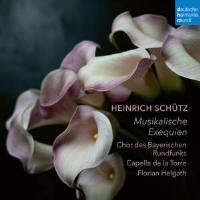Texte paru dans: / Appeared in:
|
|
|
|
|
|
As Fabrice Fitch explained in his Gramophone Collection in the last issue, there is already an extensive discography for Heinrich Schütz’s Musicalische Exequien. Nevertheless, this new release from Florian Helgath and the Bavarian Radio Choir offers a compelling account in collaboration with the ensemble Capella de la Torre.
At the fore of the first part, the Lutheran Kyrie, is the striking and declamatory tone of the soloists, who contrast with the warm blend of the choir to create a superb separation between favoriti and rhythmically taut choral ritornellos. Take, for instance, the solo alto and bass phrases beginning ‘Leben wir, so leben wir dem Herren’ (‘Whether we live, we live unto the Lord’): there is an admirable confidence to these solos, clear and belllike, immediately followed by the chorus ‘Herr Gott, Heiliger Geist, erbarm dich über uns’ (‘Lord God, Holy Ghost, have mercy on us’), which creeps in with a pleading quality. Then soloists re-enter with great rhythmic precision to declaim ‘God so loved the world’. This quickchange quality, supported by superb instrumentalists, is for me the defining quality of this release. The corresponding moment from Vox Luminis’s Gramophone Award-winning album is more reflective and prayerful; whereas my preference is for that reflective approach, I cannot but be gripped by Helgath’s visceral reading, and especially by his choir, who sing with a precision and sympathy that belies their size.
In the third part, the German setting of the Nunc dimittis, Helgath’s favoriti are set only slightly apart from the choir, whose soft choral tone provides much of the differentiation, rather than relying on spatial distance between the two groups. This works but lacks the ethereal waft of other recordings where distant soloists create a greater sense of mystery and awe.
The remainder of the programme bucks the trend of pairing this work with other commemorative pieces and instead features composers in Schütz’s sphere of influence including Monteverdi, whose Zefiro torna e di soavi accenti, in instrumental performance, is a delightfully colourful but strange neighbour to Johann Schelle’s
Komm, Jesu, komm. There is also a stately Pavane by Schütz’s protector, Landgrave Moritz of Hessen-Kassel. From a programming point of view I would have preferred the Exequien to come last, since only silence can adequately follow that magical final movement. |
|




